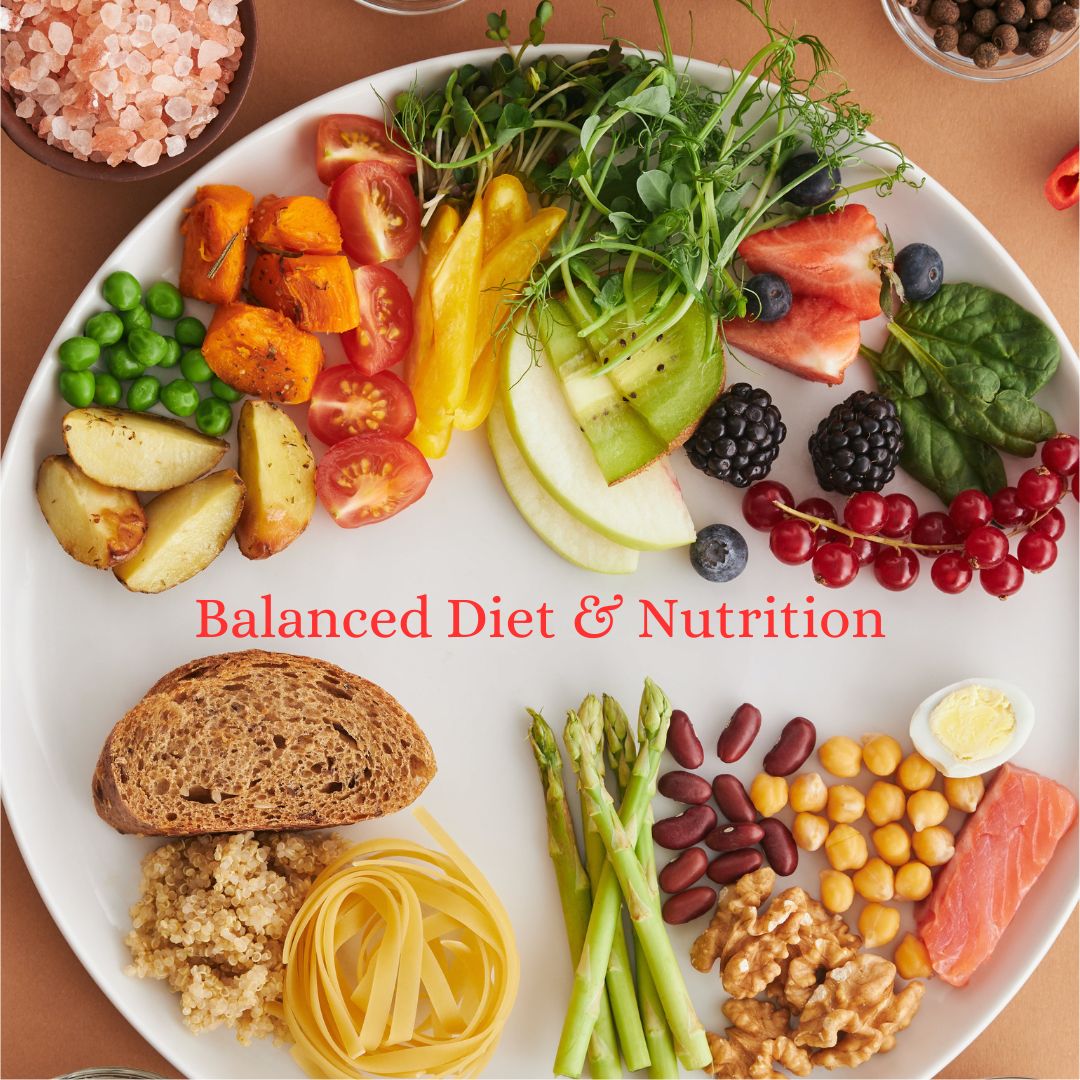Balanced diet and nutrition
Maintaining a balanced diet is important for daily nutrition. It contains both nutritious and non-nutritive components, which should be consumed in specific quantities.
Nutrients-
- macronutrients
- micronutrients
Non-nutritive components-
- fiber
- Water
- phytonutrients
Nutrients-
The components that nourish us are classified into two parts, macronutrients and micronutrients.
Macronutrients-
The nutrients we need daily, in grams, are called macronutrients. Some basic nutrients are required every day which are normal but some nutrients are required in different quantities. It depends on age, activity level, diseases, etc.
- protein
- carbohydrate
- fat
- Water
Protein – It is derived from the Greek word “proto”, which means prime. It is made of amino acids. Protein is found throughout the body. Such as hair, skin, muscles, and tissues. Protein builds and repairs tissues in our body. Enzymes, hormones, and other chemicals in the body are also made of proteins. Protein is an essential component of muscle, cartilage, skin, and blood.
Proteins provide 4 kcal of energy per gram, similar to carbohydrates.
Animal proteins: meat, eggs, milk, etc.
Vegetable proteins: beans, nuts, grains, etc.
Carbohydrates- These are also called saccharides or carbohydrates which are sugar or starch. They are the main source of food and a major form of energy for most organisms. Carbohydrates are formed by combining atoms of carbon, hydrogen, and oxygen.
The four main functions of carbohydrates in the body are to provide energy, store energy, build macromolecules, and save proteins and fats for other uses.
Energy from glucose is stored as glycogen in the muscles and liver. Consuming large amounts of carbohydrates regularly leads to weight gain as well as affects insulin regulation. When this happens, fewer and fewer carbohydrates are stored in the cells as energy, and even more, are taken to the liver to be converted into triglycerides and stored as body fat.
If we significantly reduce our carbohydrate intake, we may experience temporary health effects such as headaches, bad breath, weakness, muscle cramps, fatigue, rashes, constipation, and diarrhea.
Carbohydrates can be found in dairy products such as milk, cheese, and ice cream, as well as whole fruits, fruit juices, cereals, breads, rice, and starchy vegetables such as potatoes and corn.
Fat- Fat is a necessary part of our diet. It provides us with energy, absorbs certain nutrients, and maintains our body’s core temperature. To support these functions we need to consume fat daily.
There are two types of fat-
- Saturated fat: A fatty acid that contains the maximum number of hydrogens. When there is high cholesterol, it is also called triglycerides. Mainly it is found in animal fat.
- Unsaturated fat: Fat with low or good cholesterol levels. It is found mainly in vegetable fats such as nuts, sunflower, mustard, etc. (except palm oil).
Micronutrients-
Vitamin-
- Vitamins in fat-soluble – Vitamins A, D, E, and K
- Vitamins in water-soluble – Vitamin B and Vitamin C
Mineral
Calcium, phosphorus, magnesium, iron, copper, potassium, sodium, chloride, sulfur, iodine, fluoride, cobalt, manganese, zinc, chromium and selenium.
Non-nutritive components-
Fiber – Fiber is something that the body needs, but it is never digested.
- It comes in two forms: soluble and insoluble, and most plant-based foods contain a mixture of both.
- Soluble fiber gels in the stomach and slows digestion, which helps lower cholesterol and blood sugar.
- Insoluble fiber passes through the colon unchanged, bulking up and softening waste so it can pass through the intestine more easily.
- Dietary recommendations are that men consume about 38 grams of fiber per day and women 24 grams.
- Peas, lentils, black beans, broccoli, peas, barley, and oats are good sources of fiber.
Water- Water is very important for all living things.
- The adult human body is composed of up to 60 percent water. The brain and heart contain 73 percent water and the lungs contain 83 percent water.
- Most of the water in the human body is contained within our cells.
- Water performs important functions. Cells must function properly.
- Water is responsible for chemical and metabolic reactions, transportation of nutrients, and removal of waste from the body in addition to body temperature regulation.
Phytonutrients- These are substances in our food that add flavor, color, and taste to vegetables and fruits. Each color in food represents a different phytonutrient with different nutritional values. It is suggested to eat colorful fruits and vegetables so that we can get all the important phytonutrients.

